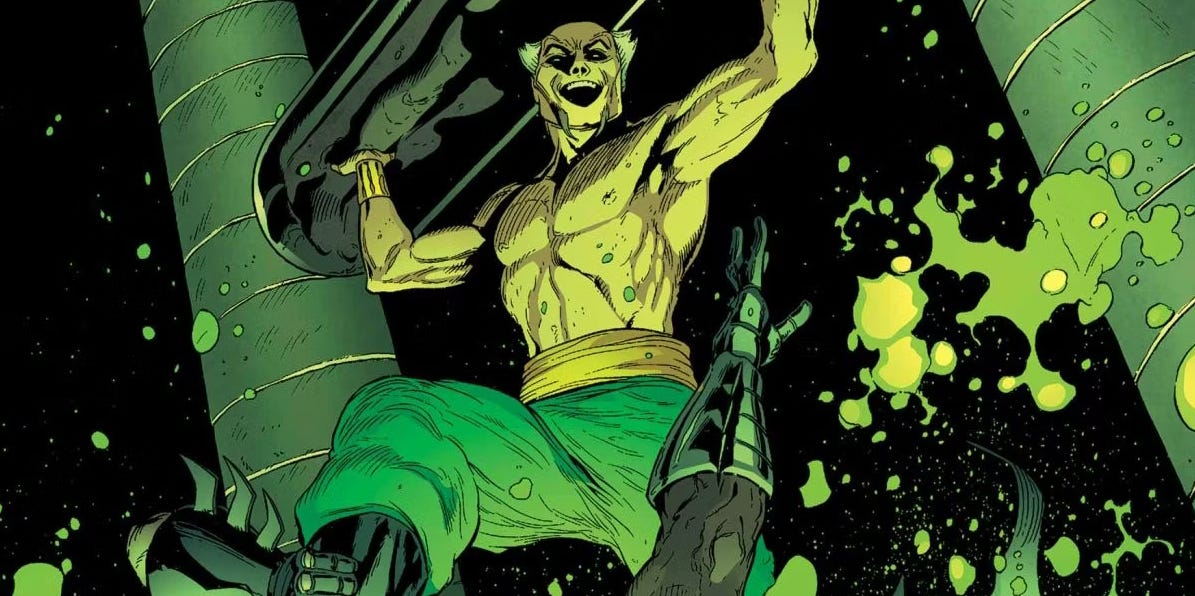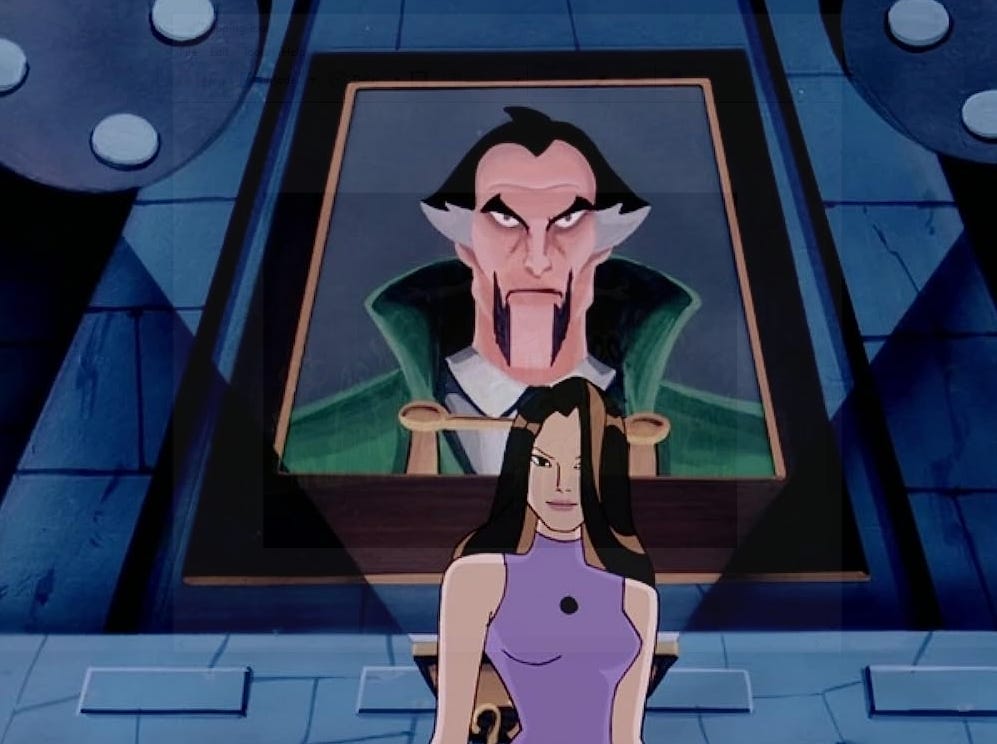I am sure there is some autist out there whose obsession with these series surpassed even mine, who perseverated enough to marathon Paul Dini and Bruce Timm's shows from Batman: The Animated Series through Justice League Unlimited. Have I seen them all and more? Of course. Would I recommend that you watch them all in order? Not necessarily.
Instead, I recommend choosing a particular character and exploring his arc from its beginning to its often tragic end. The best example by far is Ra's al Ghul.
Batman: The Animated Series introduced a generation of new fans to this character slowly -- and, in my opinion, artfully. His first appearance is in "Off Balance" (Episode 44), when his femme fatale daughter Talia teams up with Batman against the villain of the week. Batman and Talia have an immediate connection and attraction, which is sincere. Talia is legitimately ashamed when she reveals she has been planning to betray him the entire time. Batman's interest in her is nevertheless piqued, as is her mysterious father's interest in Batman.
"The Demon's Quest" (Episodes 57-58) also begins with a team up, as both Ra's and Batman's respective children are missing. The collected but overbearing Ra's reveals his improbable age and his anti-human plans to "save the world" through force rather than through voluntaryism like that of Bruce Wayne's. This team-up once again ends in betrayal, but this time Batman is prepared. We learn that Ra's has been using something called a Lazarus Pit to extend his life. We also learn that he has a low regard for Talia, whose sex somehow makes her unqualified to be his heir, yet whose love and loyalty for her father is only somewhat challenged by her love for Batman. Ra's wants Batman to save the world his way, by resetting the human population. Batman, of course, refuses. Although we presume Ra's dead at the end of this story, Batman and Talia still go their separate ways, perhaps because Batman knows Talia's divided heart is prone to disloyalty.
In addition to the homage to adventure genre evident in “The Demon’s Quest,” Batman: The Animated Series is often an homage to the silver screen era of film and television, and perhaps also a nod to Max Fleischer's Superman serials. This is especially apparent in episodes like "Avatar" (Episode 69) whose opening is reminiscent of the Universal horror classic, The Mummy (1932). Ra's is alive and on a quest to find the tomb of a seductive Egyptian queen with power over death who, of course, turns out to be an undead horror. Talia is heartbroken that her father never bothered to tell her he survived. She teams up with Batman again to find Ra's. Batman is simping hard, which is why he's the only person surprised by her betrayal. Still calling him "beloved," Talia abandons him in the desert. Ra's "is, after all, [her] father."
I was extremely offended by this episode as a little girl. Evil undead queens can't lead to anything good! People who love each other don't betray each other! Of course, that was the point, effectively illustrated without being blatantly stated.
Our next stop is Superman: The Animated Series, Episode 51: "The Demon Reborn." Why? First of all, it's always fun when Batman teams up with Superman. Secondly, the attempt by Ra's to steal Superman's strength apparently ends in Ra's and Talia's deaths. This leads us directly to one of my favorite stories, Batman Beyond, Episode 44: "Out of the Past."
Bruce Wayne is old now. Most of the people he loves have died or been alienated by his obsessive quest for justice. The idol he gave it all up for -- being Batman -- is now something he has to share with a (sometimes bumbling) kid because his body is breaking down and his fear of death nearly caused him to literally pull the trigger. The timing isn't lost on Talia, who appears looking as young as she ever did and pleas with Bruce to join her. Bruce gives in to temptation and seizes a second shot at youth, only to hate himself for it. Talia's men attack him. Fighting side-by-side with his protege, he confronts Talia, who turns out to be dead. The Lazarus Pit had been unable to save Ra's, who then "called upon Talia to undertake the ultimate sacrifice" and transferred his consciousness to her body. Now he wants Bruce’s body (and other resources). Disgusted at the cowardice of Ra’s and the tragic loss of Talia, Bruce finds the courage to one day face his own death. He allows the effects of the Lazarus Pit to fade.
In a brief dénouement, Bruce quietly grieves what might have been. He loved Talia, and she loved him, but she was ultimately incapable of choosing him over her maniacal father. The plans of Ra's seemed to have good ends, but he revealed himself as insecure, triply tyrannical over matters of life and death: unable to relinquish control over the people of the world, the sex of his child, or his own mortality. The more he tried to become a god, the more he became a monster. Both these characters were written with incredible consistency. Without being explicitly told what to think, we walk away from the story assured that the worst trap we can fall into is that of our own brokenness.
Any episodes you would have included or left out? Let me know in the comments and subscribe for more premium nerd content, NERD










Ra’s appeared one other time in the DCAU - in the episode “Showdown,” which is primarily a flashback to Jonah Hex encountering him in the 19th century. I won’t spoil what it has to do with Batman, other than to say that it’s another example of the heartfelt writing BtAS did so well.
As an Arabic speaker myself, I'm always to pleased to see a Batman villain with an Arabic name. Ras is a fun villain, for sure. He's the demonic father-in-law, getting in the way of Talia and Batman, perhaps? Great article, another amusing analysis.